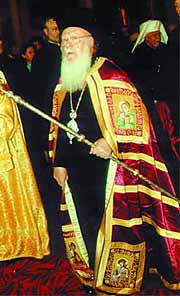
Ecumenical Orthodox Patriarch Bartholomew of Constantinople speaks about the Popes forthcoming visit to Istanbul, religious freedom and there is a little about the Turkish state control (persecution) of the Orthodox Church Turkey as well as a snippet about thre Orthodox- Catholic talks in Belgrade.
"In general, the pope is awaited in Turkey with joy and love," he said. He added that he was certain the government would take all necessary security measures to guarantee the pope's safety during the visit. Patriarch Bartholomew met with reporters the day after the European Union pressed the Turkish government to take several steps to respect the rights of religious minorities. Turkey is trying to enter the European Union, and Orthodox church officials are hoping that process will help expand religious freedom in the country.
The patriarch ends by speaking of the recent theological encounter in Belgrade, Serbia-Montenegro, opened the way for a discussion on papal primacy, long considered one of the most difficult ecumenical issues. Metropolitan John of Pergamon, Orthodox co-chairman of the international Catholic-Orthodox theological dialogue commission, told the reporters that Orthodox representatives to the dialogue have somewhat divergent views on papal primacy. Because they represent 15 Orthodox churches, he said, they do not feel they have to assume a unified position."Of course, the Roman Catholic Church is more disciplined, more organized, more obedient. We are more ...," he said, pausing to find the right word."Democratic," Patriarch Bartholomew said with a laugh, completing his sentence for him.
read whole article


6 comments:
Bishop Kallistos ware tells a story worth repeating.
In the 17th century some Greeks established a church in London. When the Anglican Bishop Compton heard of it he gave them an ultimatum that he would close it unless they removed the icons, refrained from invoking the Saints in the liturgy, and repudiated the doctrine of Transubstantiation.
Word made its way to Constantinople, and the Ecumenical Patriarch summoned the English Ambassador to the Sublime Porte to protest.
The Ambassador told him, "It is illegal for any public church in England to profess Romish beliefs, and it is as bad that they should be professed in Greek as in Latin."
Interestig Michael
I meant, "interesting", Michael.
For Christianity to survive intact, it is high time the similarities of the varieties of the Faith are acknowleged above the differences.
Are all Christians not your brothers and sisters in Faith.
Time to drop these anachronistic conflicts which amount to little more than discussion as to what clothes to wear, ands get down to the nitty gritty of the real world situation.
Why are the Church leaders more interested in talking to other Faith believers who will never change what they believe to be written in stone, when they coulkd be UNITING all Christians who have much the same core beliefs.
Political correctness has no place in the survival of Faith.
I argue that it is a rampant disease imposed by masked-Marxists and Totalitarian Liberalists who have turned "Das Kapital" on it's head in much the same way as the animals on Orwell's Farm did to their society.
The Pope should turn from his fruitless "dialogue" with Islam and give his power and effort to setting the grounds for uniting Christianity.
It could all be put in motion with just a few words.
The Church is slipping ever more into irrelevance and secularist apologia, is time for dramatic challenges rather than theoretical nit-picking and back-patting of old enemies?
It's important for the Pope to continue to dialogue with Islam as much as possible, right to the bitter end.
That way, when the Muslims rage against Christians around the world and persecute us, the rest of the world will see that we didn't provoke them, and it's all their fault, not ours (cf. the words of Our Lord, "They hated me for no reason at all.")
In the meantime, let the Church point to the Jews as a demonstration that God keeps faith with His people even in unbelief. Both Islam and every schism and heresy from the Church justifies itself, at least implicitly, by an appeal to supersessionism, and could not long survive its refutation.
m Petek, thankyou for your answer. You make a good points, I like your website, interesting.
Post a Comment